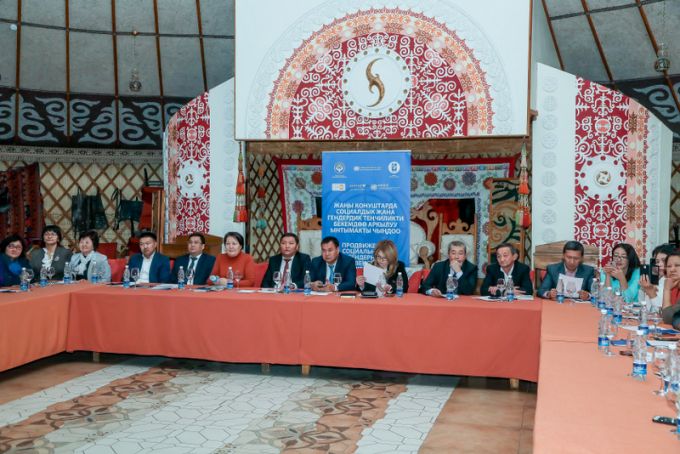A round table discussion was held on cooperation between local governments and active residents of the capital's new buildings
November 21, 2018, 06:00
On November 19, 2018, in the framework of a joint project of UNFPA, UNICEF, and UNODC on social and gender equality and preventing conflicts in residential areas, a round table was held in the “Supara” ethno-complex to review the interaction between local authorities and active residents of residential areas to reduce social tensions, timely identify and resolve potential conflicts.
This meeting provided a dialogue platform for representatives of the Bishkek City Hall, heads of municipal administrations of the capital's districts and municipal-territorial administrations to review the experience of interaction between local authorities and youth activists from pilot housing estates as part of a joint project of UNFPA, UNICEF and UNODC. The meeting was attended by the deputy of the Bishkek City Kenesh N. Kulmatova, the head of the social department of the Bishkek City Hall Davletbaev A.S., the main expert M. Chydyeva, the heads of four municipal administrations of the Bishkek City Hall districts S. Bolotbekov, T.Sultanov, N .Tynaev, R.Aytymbetov and heads of 6 municipal-territorial administrations, as well as representatives of youth, public health committees and activists of quarterly committees.
During the event, the start of project overview was made. Also, in order to reduce social tensions, effective approaches and practices of interaction of local governments with residents of 10 pilot residential areas were identified, timely identification and resolution of possible conflicts were made.
In her presentation, the project coordinator S. Dzhusayeva spoke about the process of project implementation, and covered youth initiatives in pilot residential areas, advocacy activities carried out by youth groups, girls / boys who promote ideas of peace and harmony in pilot residential communities for youth sports initiatives, on intersectoral cooperation with the local municipal authorities on joint gender; conflict-sensitive planning and on measures to improve the effectiveness of public health committees in disseminating information on healthy life; the formation of trust between the residents of residential community and public health committees; on how one can increase the awareness of residents of residential areas about the importance of preventing conflicts and creating a safe environment. Key approaches to promote good governance, assistance in creating conditions for positive peace and principles of social and gender equality were presented.
The interim results of the project were demonstrated as followes 106 youth activists from 11 residential areas are grouped into initiative groups, 27 employees of the municipal authorities received trainings and 22 employees of local municipal authority received consulting support on planning and working with the community, 7 youth initiatives were awarded through competition and received funding of $ 61,933. 8 advocacy actions with the participation of 265 youth activists were held with the help of local municipal workers on priority issues; the construction of sports grounds, children's centers, street lighting and electric power, in 5 priority areas (education, leisure, sport, ecology and safety) are included in Youth program. It was discussed also how to consolidate the positive practice and make the system experience of interaction and cooperation between youth groups, active residents and local self-government bodies effectively, and about ways to find sources of financing.
The representative of the Association of Crisis Centers T.Tulekova presented the Committees for the Prevention of Violence Against Women, established in two pilot local municipal authorities and about plans for intersectoral interaction in other local municipal authorities .
Kulmatova N.A. spoke in detail about the reserve fund of deputies of the city Kenesh, about fundraising, about the strategic plans for the residential areas of the city Kenesh and called for active cooperation of residents-potential voters of 2020, the year of elections of the city council and the Parliament. N. Kulmatova also noted that she would take control over the implementation of the City Development Plan and the inclusion of development plans for residential areas in the city’s strategic development.
During the work in groups, to improve the efficiency of the system of interaction and cooperation between the MTH, youth groups and members of public health committees a set of measures was developed as well as in mobilizing resources for the implementation of joint initiatives on intersectoral interaction. Also, based on the results of the round table, recommendations for planning activities within the framework of the project for 2019 were made.
In conclusion, the participants expressed their gratitude to the organizers of the round table for their cooperation and assistance in the implementation of youth initiatives.